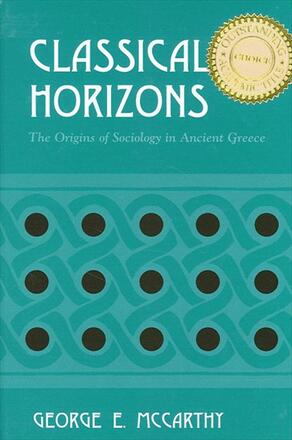
Classical Horizons
The Origins of Sociology in Ancient Greece
Alternative formats available from:
Argues that classical social theory has its intellectual and moral roots in classical Greece.
Winner CHOICE 2003 Outstanding Academic Title
“McCarthy’s … erudition may very well render this work a contemporary classic in the continuing discussion of a maturing discipline.” — CHOICE
Description
2003 CHOICE Outstanding Academic Title
This work relocates the origins of nineteenth-century social theory in classical Greece and focuses on three figures: Karl Marx, Max Weber, and Émile Durkheim, all of whom wrote dissertations on the culture and structure of ancient society. Greek philosophy, art, and politics inspired their ideas, stirred their imaginations, and defined their intellectual horizons. McCarthy rediscovers the forgotten dreams and classical horizons of these European social theorists and uncovers the close connections between sociology and philosophy, offering new insights into the methods, theories, and approaches of modern social science.
George E. McCarthy is the National Endowment for the Humanities Distinguished Teaching Professor of Sociology at Kenyon College. His books include Objectivity and the Silence of Reason: Weber, Habermas, and the Methodological Disputes in German Sociology; Romancing Antiquity: German Critique of the Enlightenment from Weber to Habermas; and Dialectics and Decadence: Echoes of Antiquity in Marx and Nietzsche.
Reviews
"At a time when the social sciences and social theory are moving away from a consciousness of their political and, even, moral purpose, McCarthy's account of the origins of sociology is timely. This book should be read by anyone concerned with the withering sense of purpose in the social sciences and social theory as well as those interested in classical sociology and the intentions of its founders." — European Journal of Social Theory
"…a highly readable and scholarly book … it will be a classic in its own right. It should be required reading, not only for sociology and philosophy students, but for intellectual and cultural historians and teachers of humanities as well. — Contemporary Sociology: A Journal of Reviews
"McCarthy's … erudition may very well render this work a contemporary classic in the continuing discussion of a maturing discipline." — CHOICE
"McCarthy critically redefines the very nature of sociology. I do not think that there exist many scholars today who would have been daring enough to engage in such a daunting task. It needed a scholar and teacher who was trained both in philosophy and sociology, and mastered both. And he succeeds in presenting his work so accessibly, and so provocatively, that it should be used successfully in a variety of disciplines, including philosophy, sociology, political science, critical theory, economics, and literary criticism. This book will become a classic." — Judith T. Marcus, author of Georg Lukács and Thomas Mann: A Study in the Sociology of Literature
"One of the most interesting and engaging social theory books I've ever read." —Norman Weiner, State University of New York at Oswego